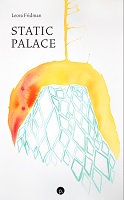Static Palace
| dc.contributor.author | Fridman, Leora | |
| dc.date.accessioned | 2022-11-29T13:55:08Z | |
| dc.date.available | 2022-11-29T13:55:08Z | |
| dc.date.issued | 2022 | |
| dc.identifier.uri | https://library.oapen.org/handle/20.500.12657/59783 | |
| dc.description.abstract | In the face of unimaginably violent systems, our most vulnerable bodies — sick, disabled, unable to rise from bed — offer the resistance of imperative vulnerability. What can we learn from the body that cannot help but fail? How can porosity perform treachery within entrenched opressions? What kind of reading and relationship to text can enrich relationship instead of inscribing boundaries between us? What does it mean to accept the unacceptable, and what kind of power becomes available when we submit to forces larger than ourselves? How might we take refuge in discomfort, and in the process refuse the stale comforts offered by hyper-capitalist economics and white supremacy? Static Palace, a collection of linked essays, weaves the writer’s experiences of chronic illness and activism under Trump rule to explore the possibility that arises from circumstances we often perceive as ruin: hopeless political systems, disabled bodies, narratives that stutter and do not complete themselves, the devastation of climate change. Spurred by the writer’s diagnosis with endometriosis and accompanying chronic conditions — which occurred immediately following the 2016 US Presidential Election — Static Palace is especially relevant in the context of rising fascism, pandemics, and the decay of social services and support networks. A direct engagement with the patchwork, fragmented brain of digital life and sick brain, Static Palace is part lyric essay and part cultural criticism: it pulls from current events, including Black-led resistance movements and disability justice activism, and cites contemporary thinkers on gender, feminism, care, critical race, and disability studies towards an artful treatment of crisis and community. Its concerns move toward connection and inter-being. By threading a wide variety of theories and politics through the personal, Fridman seeks a fertile integrity through — and with — subjectivity. We witness a mind making, culling, and attempting to stave off isolation through intertextual and interpersonal conversation. This work complicates the meaning of belonging, family and tribe, challenges our impulses toward narrative resolution, and offers a nuanced understanding of interdependent being and thought. | en_US |
| dc.language | English | en_US |
| dc.subject.classification | thema EDItEUR::D Biography, Literature and Literary studies::DN Biography and non-fiction prose::DNC Memoirs | en_US |
| dc.subject.classification | thema EDItEUR::V Health, Relationships and Personal development::VF Family and health::VFJ Coping with / advice about personal, social and health topics::VFJB Coping with / advice about illness and specific health conditions | en_US |
| dc.subject.classification | thema EDItEUR::J Society and Social Sciences::JB Society and culture: general::JBF Social and ethical issues::JBFN Health, illness and addiction: social aspects | en_US |
| dc.subject.classification | thema EDItEUR::V Health, Relationships and Personal development::VF Family and health::VFJ Coping with / advice about personal, social and health topics::VFJD Coping with / advice about physical impairments / disability | en_US |
| dc.subject.other | illness;disability;autotheory;endometriosis;body;apocalypse;gender studies;feminism | en_US |
| dc.title | Static Palace | en_US |
| dc.type | book | |
| oapen.identifier.doi | 10.53288/0411.1.00 | en_US |
| oapen.relation.isPublishedBy | 979dc044-00ee-4ea2-affc-b08c5bd42d13 | en_US |
| oapen.relation.isbn | 9781685710965 | en_US |
| oapen.collection | ScholarLed | en_US |
| oapen.pages | 178 | en_US |
| oapen.place.publication | Brooklyn, NY | en_US |

